Before the reader is a compilation of statements from the major Scholars, past and present, regarding the evils of hizbiyyah – bigoted partisanship and blind attachment to personalities. There is no question that these evils have harmed the Muslim nations tremendously. Shaykh Rabee’ Ibn Haadee al-Madkhalee – hafidhahullaah – said, “Anyone who opposes the Salafee methodology is from the deviant sects.
Hizbiyyah does not have conditions. Allaah called the previous nations: ahzaab (parties), and when the tribe of Quraysh, and those who were with them, rallied against the Messenger (sallallaahu ’alayhi wa sallam), He (Allaah) called them ahzaab, though they weren’t an organization… So blind attachment to a specific ideology that opposes the Book of Allaah and the Sunnah of His Messenger (sallallaahu ’alayhi wa sallam) and unifies and separates because of it is hizbiyyah; this is hizbiyyah even if they are not organized.”
We hope this short treatise will serve as a reminder that loving and hating, uniting and separating must be done solely for the sake of Allaah and in accordance with the Sunnah of the Messenger of Allaah (sallallahu ’alayhi wa sallam) according to the understanding the pious predecessors of this Ummah.”
Statements from:
- Shaykh-ul-Islaam Ibn Taymiyyah
- Shyakh Muhammad Nasir al-Din al-Albani
- Shaykh Abdul Aziz ibn Abdullah ibn Baz
- Shaykh Muhammad Ibn Saalih al-‘Uthaymeen
- Shaykh Muqbil Ibn Hadi al-Wadi’i
- Shaykh Ahmad ibn Yahya Al-Najmi
- Shaykh ’Abdul-Muhsin al-’Abbad
- Shaykh Saalih Ibn Fawzaan Al- Fawzaan
10 Points Distinguishing the Salafi methodology from the Ikhwani methodology
Shaykh Ahmad Ibn Yahya al-Najmi (d.1429H) said:
The Muslim Brotherhood:
The Muslim Brotherhood are the followers of Hasan al-Banna and there are a number of points against them, the more important of them are the following:
1. Negligence in Tawhid al-Uluhiyyah (Tawhid of worship) of which is the most important thing in Islam and which no worshipper’s Islam is correct except by it.
2. Their silence and concession toward people committing major Shirk, from du’a (supplication) to other than Allah and tawaf (circumambulation) of the graves and making vows to the dead and slaughtering in their names and what is like this.
3. The founder of this methodology was a Sufi who pledged allegiance to ‘Abd al-Wahhab al-Hasafi upon the [Sufi] way of the Hasafiyyah Shadhiliyyah.
4. The presence of innovations amongst them and worshipping by them. Rather, their founder affirms that the Prophet (صلى الله عليه وسلم) attends their sittings of invocation and pardons them for their past sins.
5. Their calling to the Khilafah, and this is an innovation, for indeed the Messengers and their followers were not given succession except by calling to Tawhid; Allah says,
وَلَقَدْ بَعَثْنَا فِي كُلِّ أُمَّةٍ رَّسُولاً أَنِ اعْبُدُواْ اللّهَ وَاجْتَنِبُواْ الطَّاغُوتَ
“And verily, We have sent among every nation a Messenger proclaiming: Worship Allah alone and eschew the Taghut (false deities worshipped besides Allah).” [Surah al-Nahl 16:36]
6. Absence or weakness of al-wala’ wa al-bara’ (allegiance and enmity) and this is demonstrated in their call to joining between the Sunnah and the Shi’ah, and the statement of its founder, ‘We cooperate upon that which we have agreement and excuse one another in the things we differ.’
7. Their dislike of the people of Tawhid, and their hatred for followers of the Salafi methodology, and this is demonstrated in their speech against the Kingdom of Saudi Arabia which was established upon Tawhid and teaches it in its schools, centers, and universities; and from their assassination of Jamil al-Rahman al-Afghani because of the fact that he called to Tawhid and that which he had established from schools teachingTawhid.
8. Their following after the mistakes and faults of the rulers, whether in truth or falsehood, and exposing them to the people to cause hatred of them and fill the hearts with rancor against the rulers.
9. Detestable hizbiyyah (partisanship), which they ascribe to, so they unite and separate for the sake of the party.
10. They take a pledge to abide by the Brotherhood’s methodology according to the ten conditions which were mentioned by its founder, and there are other points which can be mentioned later.
The Salafi Methodology:
1. It is to worship Allah with Tawhid and to not call upon anyone besides Him, and that we do not depend upon anyone besides Him to bringing benefit or repelling harm. And worshipping Him by disliking the polytheists; except that it is obligatory upon us to call them to al-Tawhid and to clarify for them that there is no Islam except with Tawhid and that whoever calls on a deity besides Allah has disbelieved, and whoever persists after that, it is a must to distance ourselves from them for the sake of Allah.
2. The creed of the Salaf is based upon describing Allah with what He has described Himself with in His Book or upon the tongue of His Messenger without any distortion, similitude, negation, or false interpretation.
3. We affirm for Allah His Beautiful Names that He established for Himself, and extolled Himself with whether in the Qur’an or Sunnah.
4. We believe that there is no path to Allah’s Pleasure or to paradise except by way of the Messenger of Allah, and whoever seeks a path to Allah’s Pleasure other than the way of the Messenger of Allah, then this person is misguided from the truth and is a loser in this life and the next.
5. We believe that Allah’s legislation came by way of the two revelations, the Qur’an and the Sunnah, and this is what is indicated in the statement of Allah,
“Then, We have put you (O Muhammad) upon a plain way of commandment. So follow it, and do not follow the desires of those who do not know.”
[Surah al-Jathiyah 45:18]
6. We believe that the Qur’an is the Speech of Allah and that it is not created and that the Sunnah clarifies the Qur’an and that the Qur’an is explained by the Sunnah and the commentary of the Companions and those who followed them in righteousness. So the explanation of the Qur’an is by way of narration, meaning from the [narrations] of the Companions and the tabi’in collected in the books [of tafsir], books which must be read like the tafsir of Ibn Jarir [al-Tabari] (d.310H), Ibn Kathir, al-Baghawi (d.516H), Tafsir al-Durr al-Manthurby al-Suyuti (d.911H) and what is like this.
7. It is incumbent upon us to take the Sunnah according to the way of the people of hadith in authentication and weakening [of the narrations], so we accept that which has been mentioned and reject that which has been graded weak.
8. We worship Allah by obedience to those placed in authority over us, as long as they are Muslims, judging by Allah’s Legislation, establishing the prescribed punishments of Allah and establishing the Prayer, and that obedience to them is obligatory even if they are sinful, and whoever says different and permits revolting against the leader of the Muslims, even if he is sinful, then this person is a misguided innovator; it is obligatory upon the Muslim scholars to refute him and clarify his misguidance.
9. That it is not permissible to spread the faults of those in authority, because this will lead to the spread of sedition.
10. It is incumbent upon us to worship Allah according to the Sunnah and to follow it and to abhor innovation and the innovators by the statement of the Prophet (صلى الله عليه وسلم), “Whoever does an action that is not in accordance with this affair of ours, it is rejected.” And in another wording, “Whoever innovates in this affair of ours that which is not from it, it is rejected.”1 This is a brief description of the creed of the Salaf; it is upon us to adhere to it if we want the truth and hope for success, and it is upon us to reject the statements of men which are not supported by evidences. Since, men are known by the truth and the truth is not known by men. And lastly, it is upon us to beseech Allah to show us what is the truth and to bless us to follow it, and to show us what is falsehood and bless us to avoid it, indeed He is Able, and may the Prayers and peace be upon our Prophet Muhammad, the best of creation and the most pious among them, and upon all of his Family and Companions.2
1 Related by al-Bukhari (no. 2697) and Muslim (no. 4467).
2 See Ahmad Ibn Yahya al-Najmi, al-Fatawa al-Jaliyyah (Ajman: al-Furqan 1418 A.H./1997 C.E.) pp.51-57.
Source: The Crime of Hizbiyyah Against the Salafi Da’wah, Compilation and English translation by Abu al-Hasan Malik Ibn Adam, Sunnah Publishing, pp.46-47 and 52-53.


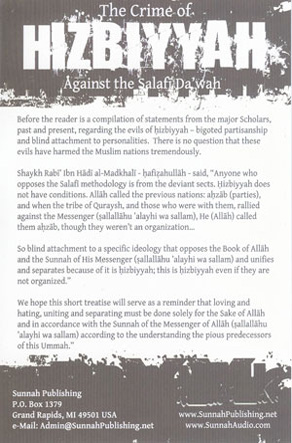
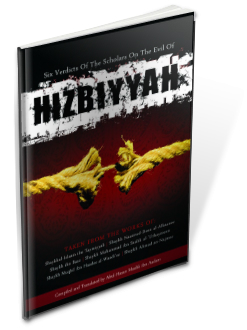


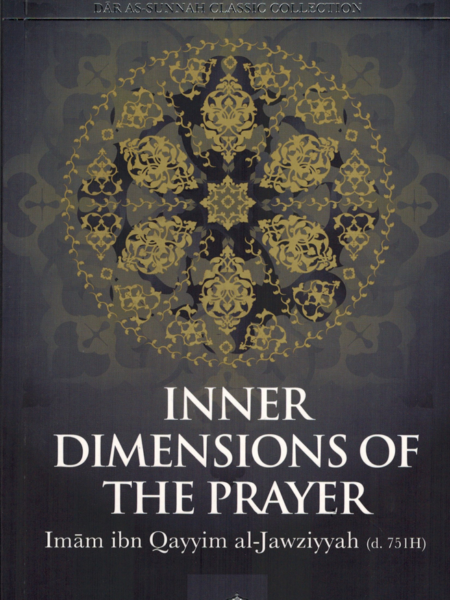
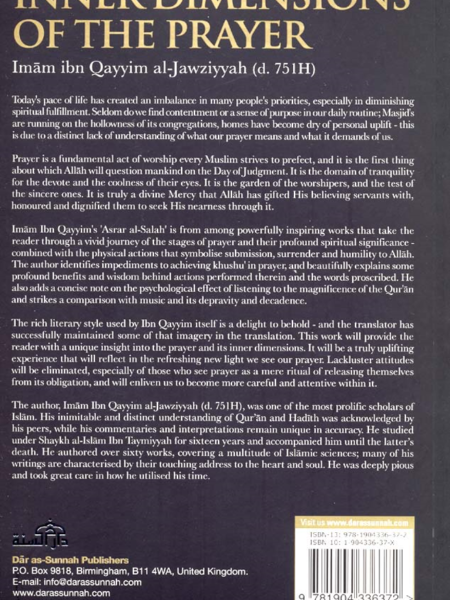
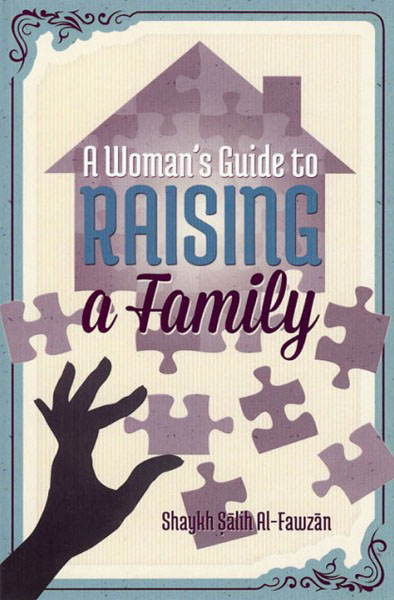

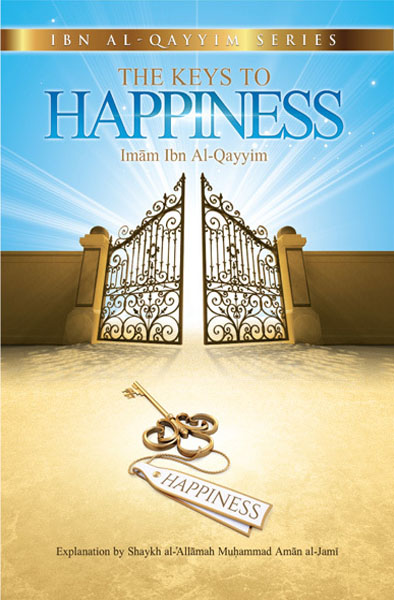
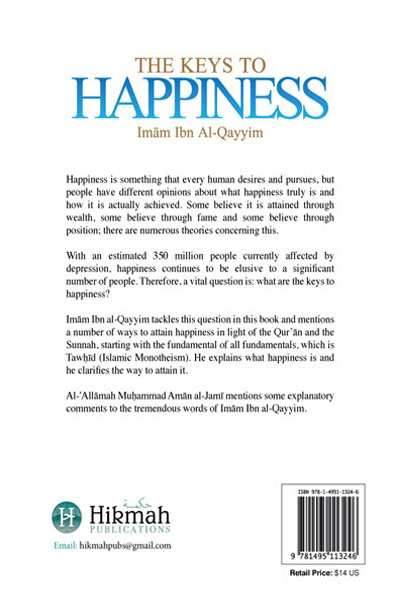


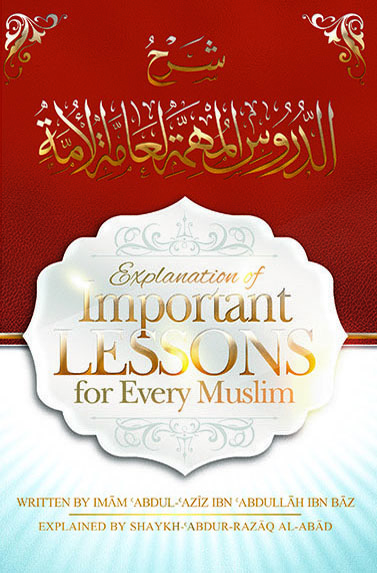


Reviews
There are no reviews yet.